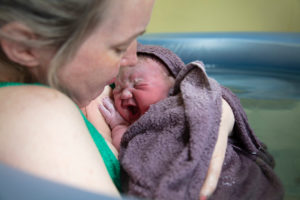DC | VA | MD Midwife Malpractice Lawyer

Only around 1 percent of U.S. mothers give birth at home in any given year, but more and more parents have been considering this option recently.
Some choose at-home labor and delivery procedures for religious or cultural reasons, a lack of transportation access, financial reasons, or simply a preference for home comforts over clinical hospital settings. For expecting parents, this might be an even more attractive option during the COVID-19 pandemic, due to concerns about exposure in a hospital setting, restrictions on visitors, and other issues.
Wherever the delivery occurs, all mothers and babies deserve a safe, supportive environment in which to experience this momentous occasion.
Midwives attending to at-home births have a responsibility to recognize and respond appropriately to home birth complications. Those who neglect this standard of care may be held liable for medical malpractice.
If you or your child sustained injuries due to suspected midwife medical malpractice, call now to schedule a free initial consultation with the D.C. birth injury attorneys of Bertram & Murphy.
Home Birth Legal Guide
If you believe an at-home birth may be the right choice for you, it’s important to give your decision some thought and contemplate how you might respond in certain situations.
What Legal Precautions Should You Take?
The Mayo Clinic provides a list of medical and legal recommendations to parents who opt for at-home birth procedures:
- Determine whether your pregnancy is “high risk.” The American College of Obstetricians and Gynecologists (ACOG) considers a pregnancy “high risk” if a mother has previously had a cesarean section, lives more than fifteen minutes from a hospital, is pregnant with multiples, or if the baby is breech.
- Ensure your chosen midwife is properly qualified and insured. Not all midwives have official licensure or certification, so it’s important to investigate the qualifications of any midwives you consider. It’s also a good idea to research whether potential midwives carry medical malpractice insurance or have a history of medical malpractice allegations.
- Develop a home birth backup plan. While most home births are carried out with no complications, it’s always a good idea to prepare for any eventuality. Ask your midwife whether they can legally provide medical equipment like oxygen tanks or Doppler fetal monitors, what their plan is for potential complications, and whether they have an obstetrician on call. Also, consider routes to nearby hospitals in case of emergencies.
- Consult an experienced attorney if you or your baby have been injured. If you experienced unexpected complications during an at-home delivery, it’s a good idea to speak with a knowledgeable attorney. Your lawyer can investigate what happened, determine if negligence played a part in the harm you or your baby suffered, and inform you of your rights and legal options.
How Do You Know Your Midwife Is Certified for At-Home Delivery?
Since midwives are not physicians and do not have access to hospital-grade equipment for at-home births, it’s important to pay special attention to their certifications before retaining any services.
There are three main types of midwives, including:
- Certified nursing midwives (CNM)
- Certified professional midwives (CPM)
- Non-certified individuals who practice midwifery
CPMs are most common and usually medically preferred since they receive special training and regular recertifications. However, only 27 states currently have CPM licensing programs.
Washington, D.C. has no CPM licensure available and does not regulate “direct-entry midwives” who practice without certification. CNMs, trained nurses who normally work in healthcare facilities, can be licensed in D.C. as advanced practice registered nurses (APRN). While an APRN acting as a CNM will certainly have undergone rigorous medical training, many nurses do not have liability insurance coverage for home births.
Can You Sue a Home Delivery Midwife for Malpractice?
Midwives are healthcare professionals who offer important services to their communities. Like any other provider, they have specific and significant responsibilities to their patients.
Midwives are unable to perform emergency surgical procedures or administer many forms of life-saving treatment in the event of a difficult delivery. As such, they face limitations and have a duty to maintain regular communication with physicians throughout their clients’ pregnancies.
Midwives are responsible for responding quickly to any complications that arise during labor and delivery, as well as contacting attending physicians for matters beyond their expertise. If you or your infant sustained a birth-related injury due to a midwife’s failure to uphold their duties, you may be eligible to pursue legal action against them for medical malpractice.
Who Is Liable for an At-Home Birth Injury?
While midwives can be sued and found liable for at-home birth injuries, demonstrating negligence in cases of midwife medical malpractice is often difficult. Proving that a midwife’s specific action or inaction was the cause of a particular home-birth-related injury can be challenging, especially if they were unlicensed or you should have been aware that your pregnancy was high-risk.
That being said, CPMs and CNMs are professionals who owe patients a duty of care. If they fail to provide appropriate standards of care, they may be found liable. If midwives accused of malpractice carry liability insurance, any claims against them will likely first go through their malpractice insurance provider. If a reasonable insurance settlement cannot be reached, your medical malpractice attorney can help you bring malpractice charges in civil court.
Home Birth Complications vs. Negligence
Research by the ACOG indicates that planned at-home deliveries are associated with slightly higher risks of certain complications than planned hospital deliveries. Specifically, infants are approximately twice as likely to suffer fatal injuries in home births as compared to hospital births. Also, though neonatal seizures are incredibly rare overall, they are still roughly three times more likely to occur during at-home births.
Regardless, midwives are responsible for recognizing high-risk situations and seeking more intensive medical care as needed. A midwife could be held liable for medical malpractice if they do not recommend hospital transfers for circumstances such as:
- Labor failing to progress normally
- Infants showing signs of distress
- Infants not advancing in headfirst positions
- Mothers needing relief from significant pain
- Mothers exhibiting high blood pressure
- Mothers or infants who are bleeding
Get Insight from a Home Birth and Midwife Malpractice Lawyer
If you or your infant experienced home birth complications or injury due to midwife negligence, you deserve justice and fair compensation for your hardship. Contact the award-winning medical malpractice attorneys of Bertram & Murphy, in Washington, D.C. for a free case review by calling us or by filling out our online contact form today.















